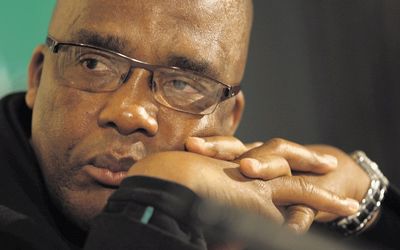SOUTH African Health Minister Aaron Motsoaledi has distanced himself from a controversial proposal in the White Paper on National Health Insurance (NHI) to slash the benefits offered by medical schemes, saying the state should not limit patients’ choices.
He has also dismissed the paper’s cost projections, saying NHI is a long term-project that should be financed on a programme-by-programme basis.
The White Paper, released by the minister for public comment on December 11, proposes mandatory membership of NHI and reduces the role of medical schemes to merely providing "complementary services". It says the annual cost of NHI in 2025 will be R256bn in 2010 terms, assuming the economy grows at 3.5% a year.
The minister’s remarks will come as relief to middle- class consumers and businesses, as they signal a strong future role for private healthcare and a prudent approach to government spending on NHI.
The International Monetary Fund estimates South Africa’s economy will grow by just 0.7% this year.
The White Paper proposes sweeping reforms to the healthcare sector in an attempt to narrow the gap between the services enjoyed by rich and poor. Only 16% of the population belongs to medical schemes, which enable better-heeled consumers to insure themselves against future health expenses and access private healthcare. The rest of the population depends on the state sector, where the quality and availability of services vary widely.
In an extensive interview with Business Day, the minister said: "We are not envisaging burning medical schemes outright. The private schemes like Discovery, we don't think it will be fair for anyone of us to say they are no longer going to work. We want people to make their own choice. We want to make it clear that NHI will be mandatory, just like it is in England. No millionaire is not part of the NHS (the British) National Health Service), but if he says he wants to do something privately they will allow it," he said.
When asked how he reconciled this vision with the White Paper's proposal that medical schemes provide only complementary cover and not duplicate services offered by NHI, he said: "I was a little disappointed that in the White Paper it might appear to be giving the wrong impression. There is nothing wrong with giving a person their own choice, and (to) buy whatever (they want)."
This aspect of the paper needed to be clarified and "sharpened", he said.
Dr Motsoaledi said NHI would not be implemented in one fell swoop and that it was impossible to put a price tag on it because there were too many parameters that could change over time.
"I want to reassure the nation that you do it in bits and steps. We want to start with primary healthcare. We have calculated the money we have in the public health system (for primary healthcare) that isn't being used in the way it should be is R44bn. We can make a start with this and say it is the start of NHI we are building," he said.
Jonathan Broomberg, CEO of Discovery Health, SA's biggest medical scheme administrator, said: "We agree with the view that once they have paid their mandatory NHI contribution, members of the public should retain the freedom of choice to purchase private health insurance. This is the practice in virtually every system of NHI across the world. It would also benefit the system as a whole by reducing the NHI’s service delivery burden.
"There remains a pressing need to update current medical scheme legislation, and it is important that the NHI policy process does not delay this. Medical schemes are sitting on an estimated R10bn in excess capital, and reforms to the current solvency regulations for medical schemes would immediately assist with affordability of scheme premiums." he said.
Insight Actuaries and Consultants joint CEO Barry Childs said SA’s health system required cohesive reform, including improved regulation of medical schemes, to ensure equitable and quality coverage for the whole population. Costing the NHI on a programme by programme basis would improve predictability and planning, he said.
Dr Motsoaledi said reforms to the solvency requirements of medical schemes were needed, as well as tighter regulation of health insurance products, such as hospital plans. But he said he had instructed the Council for Medical Schemes to scrap its plans to for low-cost medical schemes, because they did not provide adequate benefits.
The minister said he supported the White Paper's plan to scrap government subsidies for medical schemes, which include R16bn in tax credits for medical scheme members and another R20bn provided to civil servants as part of their salary packages. These subsidies were fundamentally unfair as they provided government support to people who were already well-off, he said.
"How can I justify it for people who can take care of themselves?" he said.

GO-TO MAN: Health Minister Aaron Motsoaledi needs to come to the aid of the pharmaceuticals industry by making an extraordinary price adjustment for private sector medicines, the industry says. Picture: SUNDAY TIMES
SOUTH African Health Minister Aaron Motsoaledi has distanced himself from a controversial proposal in the White Paper on National Health Insurance (NHI) to slash the benefits offered by medical schemes, saying the state should not limit patients’ choices.
He has also dismissed the paper’s cost projections, saying NHI is a long term-project that should be financed on a programme-by-programme basis.
The White Paper, released by the minister for public comment on December 11, proposes mandatory membership of NHI and reduces the role of medical schemes to merely providing "complementary services". It says the annual cost of NHI in 2025 will be R256bn in 2010 terms, assuming the economy grows at 3.5% a year.
The minister’s remarks will come as relief to middle- class consumers and businesses, as they signal a strong future role for private healthcare and a prudent approach to government spending on NHI.
The International Monetary Fund estimates South Africa’s economy will grow by just 0.7% this year.
The White Paper proposes sweeping reforms to the healthcare sector in an attempt to narrow the gap between the services enjoyed by rich and poor. Only 16% of the population belongs to medical schemes, which enable better-heeled consumers to insure themselves against future health expenses and access private healthcare. The rest of the population depends on the state sector, where the quality and availability of services vary widely.
In an extensive interview with Business Day, the minister said: "We are not envisaging burning medical schemes outright. The private schemes like Discovery, we don't think it will be fair for anyone of us to say they are no longer going to work. We want people to make their own choice. We want to make it clear that NHI will be mandatory, just like it is in England. No millionaire is not part of the NHS (the British) National Health Service), but if he says he wants to do something privately they will allow it," he said.
When asked how he reconciled this vision with the White Paper's proposal that medical schemes provide only complementary cover and not duplicate services offered by NHI, he said: "I was a little disappointed that in the White Paper it might appear to be giving the wrong impression. There is nothing wrong with giving a person their own choice, and (to) buy whatever (they want)."
This aspect of the paper needed to be clarified and "sharpened", he said.
Dr Motsoaledi said NHI would not be implemented in one fell swoop and that it was impossible to put a price tag on it because there were too many parameters that could change over time.
"I want to reassure the nation that you do it in bits and steps. We want to start with primary healthcare. We have calculated the money we have in the public health system (for primary healthcare) that isn't being used in the way it should be is R44bn. We can make a start with this and say it is the start of NHI we are building," he said.
Jonathan Broomberg, CEO of Discovery Health, SA's biggest medical scheme administrator, said: "We agree with the view that once they have paid their mandatory NHI contribution, members of the public should retain the freedom of choice to purchase private health insurance. This is the practice in virtually every system of NHI across the world. It would also benefit the system as a whole by reducing the NHI’s service delivery burden.
"There remains a pressing need to update current medical scheme legislation, and it is important that the NHI policy process does not delay this. Medical schemes are sitting on an estimated R10bn in excess capital, and reforms to the current solvency regulations for medical schemes would immediately assist with affordability of scheme premiums." he said.
Insight Actuaries and Consultants joint CEO Barry Childs said SA’s health system required cohesive reform, including improved regulation of medical schemes, to ensure equitable and quality coverage for the whole population. Costing the NHI on a programme by programme basis would improve predictability and planning, he said.
Dr Motsoaledi said reforms to the solvency requirements of medical schemes were needed, as well as tighter regulation of health insurance products, such as hospital plans. But he said he had instructed the Council for Medical Schemes to scrap its plans to for low-cost medical schemes, because they did not provide adequate benefits.
The minister said he supported the White Paper's plan to scrap government subsidies for medical schemes, which include R16bn in tax credits for medical scheme members and another R20bn provided to civil servants as part of their salary packages. These subsidies were fundamentally unfair as they provided government support to people who were already well-off, he said.
"How can I justify it for people who can take care of themselves?" he said.





















Change: 2.48%
Change: 2.53%
Change: 2.08%
Change: 1.97%
Change: 5.33%
Data supplied by Profile Data
Change: 0.00%
Change: 0.00%
Change: 2.48%
Change: 0.00%
Change: 0.00%
Data supplied by Profile Data
Change: 0.16%
Change: 0.27%
Change: -0.04%
Change: 0.14%
Change: -0.11%
Data supplied by Profile Data
Change: 0.00%
Change: 0.00%
Change: 0.00%
Change: 0.00%
Change: 0.00%
Data supplied by Profile Data